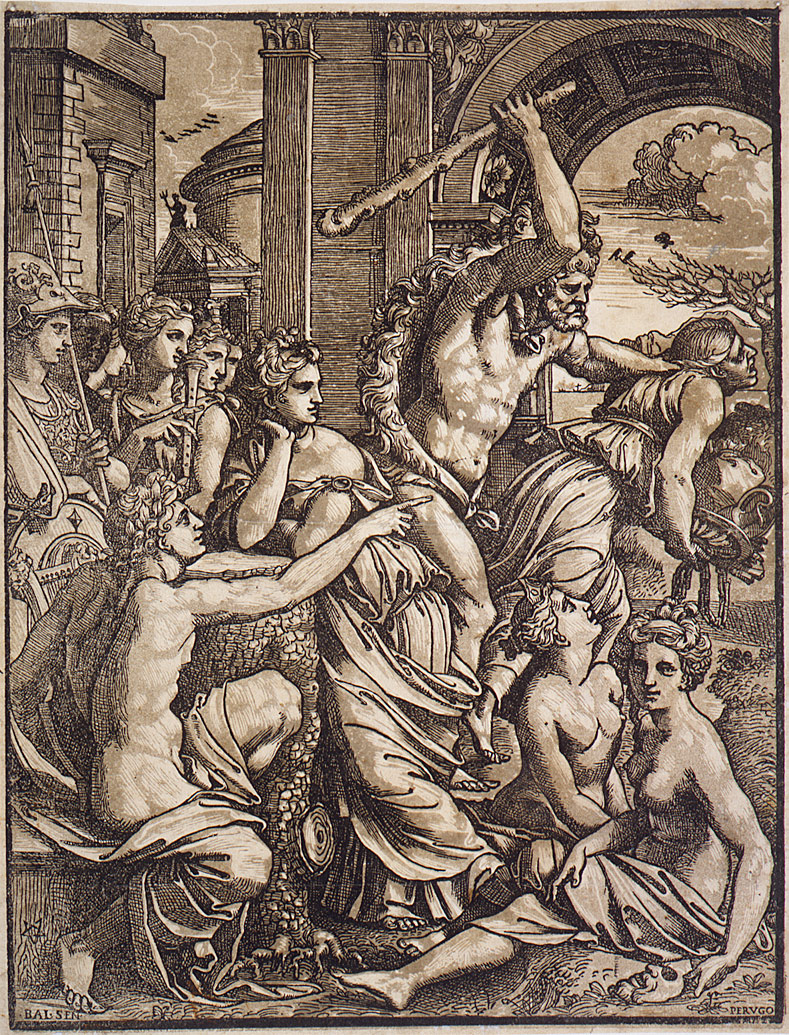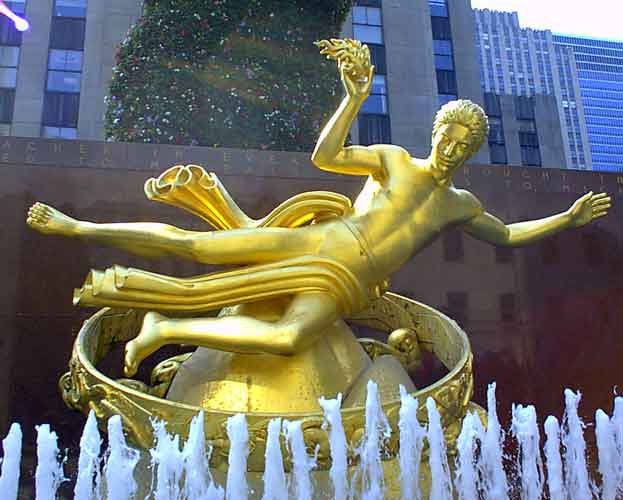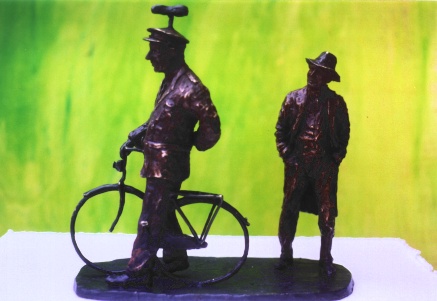
To learn more about this image, Hercules Chasing Avarice from the Temple of the Muses,
go here.
The proximate causes of the current economic meltdown have to do with aggressive and malign mortgage lending practices which were used to generate mortgage bundles which were turned into securities and commoditized and leveraged as assets to borrow multiples of their amortized values to invest in who knows what else. Insurers insured and reinsurers reinsured these assets banking on the streams of income they promised. When the underlying assets began to lose value, that is to say when some of the mortgagees began to default, the whole teetering superstructure collapsed on itself. The 'stuckees' left holding the bag panicked and chaos ensued.
What does that mean? Let's put it in more concrete terms. Let's say you want to buy a house. You take out a 30-year mortgage from me (I'm a bank) for $300,000 at reasonable terms I think you can afford (assume my good faith for purposes of this example). Good. Now, I calculate the value of that mortgage over those 30 years—let's say it's $1 million, to keep it at round figures: that is, principle plus interest. Assume I have 1000 identical mortgages. According to my math, I now have $1 billion in assets—even though you and your fellows will only be paying me a few hundred dollars each each month. There is, of course, a lot of risk in this assumption, including people defaulting on their mortgage obligations to me, people paying down their mortgages early, etc. Ignore that for now.
Now, here's where the real magic comes in. I can do a number of things with $1 billion in these (sort-of) assets that you can't do with $1000 in real assets. I can sell them to a bundler for an agreed-upon price (it will be higher, in a rational world, for mortgages that have little risk of default and lower for riskier such assets). The bundler can slice them up into 'tranches' and sell security interests in the underlying payment streams. If the bundler (or purchaser of slices of mortgage bundles) is a hedge fund, it can borrow against them (up to an Enron-like 27-to-1 ratio) and invest the proceeds. The idea is that you can make greater returns on $27 billion than on $1 billion, especially if your return on assets is greater than the interest you're paying on the $27 billion. But remember, this is all leveraged on the back of only 1000 x $300,000 mortgages. Pretty soon, we're talking real money. And, even though they're supposed to be asset-backed, nobody can really tie any specific aspect of those $27 billion in investments to grandma's $300,000 condo in Fort Myers.
As in all things, Murphy's Law applies: Things can go wrong at any point in this process. Some examples: you lose a job, you are not qualified for a $300,000 mortgage, a mortgage broker falsifies/spins your qualifications, you repay early, you default, you take out a second mortgage on any equity you've accumulated (beginning a second line of leveraging), prices on real estate in your neighborhood/city/state/country/world tank because of foreclosures or souring economic times or whatever, you are otherwise "underwater" on your mortgage (i.e., your home is now worth less than the mortage(s) you've taken out on it), my investment returns don't exceed my interest rate, the hedge fund goes short on some investments and gets the equivalent of a 'margin call' on its leveraged debt, etc., etc.
This is a rough, general outline of the narrative of the origins of the current economic crisis. Some of the particulars may be off a bit; I'm not an economist. Top-heavy debt. Leverage. Uncertainty. These are real. And it doesn't take long before the whole thing comes crashing down, and not necessarily for rational reasons.
But to look no further than these let's call them 'symptoms' is to miss the underlying malaise, which is a philosophical if not spiritual one. Let me explain.
The incentives to borrow, to leverage are built in to the system. Capitalism, as practiced in the U.S. lo these many years, is aspirational. Its laissez-faire attitude toward the accumulation of wealth in the private sector is, of course, one of its hallmarks. As is its inbred antipathy toward the public-sector, in general.
Current laws and corporate practices tend to favor managers over shareholders, not to mention other interested parties. This has been a huge recent trend. Shareholders delegate/relinquish control of corporations to management: that's the definition of the corporate structure. It seems this is a fatal flaw.
In the current climate, it is the shareholders who are suffering as managers have driven their corporate assets into the ground—particularly in the financial sector which is the locus of the crisis we're in: banks are either going under or their share values are down over 90%. And, of course, the CEOs and other managers have been making out like bandits as they reap huge salaries and bonuses and share options whether or not they perform (i.e., create shareholder value). The difference between executive pay and average labor wages has increased radically over the last decade.
They have been managing their companies the way the Bush administration ran the country: their own interest in retaining power has taken precedence over the shareholders' interest in the well-being of their company. They didn't care whether they bankrupted the company/country, so long as they benefited in the short run.
There are a number of stakeholders in any given company: (a) the owners: shareholders; (b) the creditors: bondholders; (c) the managers: management; (d) the customers: purchasers (down chain); (e) the suppliers: vendors (up chain); (f) labor: the employees; as well as (g) any number of indirect beneficiaries: the local community of landowners, schools, churches, local governments, and suppliers of goods & services to local employees. There are more. To manage a company as if only the management's retention of its jobs and power is to neglect the interests of the rest of these stakeholders. This is a big problem.
As a political corollary, to manage a country as if the primary interest of the administration was to maintain its own power is to neglect a far-greater constituency of stakeholders in the country's well-being. I'll not enumerate them here, but it's pretty much everybody. And, though clearly analogous and key to any serious look at what has happened to our country over the past eight years, that is a political discussion for another day.
We have become less an "ownership society" than a "management society" where management means, essentially, to handle things. To supervise or run things. To control the situation, or at least appear to be in control. To achieve short-term profit, or the appearance thereof. To work around. To lurch from crisis to crisis or kick the can down the road. So much management today is simply PR, and that mostly self-serving. One even thinks of the locution of doctors "managing" an incurable disease: it only applies when they are incapable of curing it. The focus is all wrong for a viable company/country.
Management is not the same thing as problem solving. Problem solving means identifying problems, determining the underlying issues, and resolving them. This is not the same thing as controlling the situation, or the perception of the situation. True, one must have some form of control before solving something, but corporate America tends to reward more those who control the perception of things than those who actually roll up their sleeves and try to solve problems. PR triumphs.
Bush/Cheney/Rumsfeld et al. touted themselves as the CEO presidency. They were consummate managers. Bush had a solid track record of managing businesses (
Arbusto Energy,
Harken Energy) into the ground (that in itself should have alerted us to something), only to be bailed out at the last moment by rich friends of his father, including Osama bin Laden's brother. That they managed the country into the current situation should not be surprising, especially as they used their power to de-regulate and slacken enforcement of the laws and regulations put in place to protect stakeholders in the country's well-being other than the management/capitalist class. In fact, it was entirely predictable.
I wonder, too, if anyone's done a study of how many billions of dollars they spent on PR alone. We know they paid newspaper columnists and fiddled with the rules about on-shore military propagandizing and kept Hill & Knowlton-types on retainer. Not to mention Karl Rove. They set out to make the country in their own image. And it is now bankrupt.
It is my hope we've elected a problem solver as President. A true problem solver is unafraid of negotiation and input from others who share his interest (namely, solving the problems). In terms of company/country organizations, solutions from below are generally received as threats to the power of managers. It does not make them appear to be in control. For true problem solvers, the more input the better the available options.
Drat. I've veered off into politics again. And I didn't want to do that. But there is a philosophical point there. The Presidency inspires. If the president is a manager (as we've defined), then others will emulate. If the president is a problem solver, then, hopefully, problem solvers will rise.
This doesn't address the 'spiritual' crisis I mentioned. And by that I am not referring to any sort of religious notion. Stay with me here: Right after 9/11, President* Bush, in his initial response to the crisis, exhorted Americans to "go shopping." I remember at the time being stunned silly: 'WTF is he talking about?"
What that exhortation revealed was Bush's own true conception of the basis of American capitalism and, more to the point, his own deep-seated contempt for Americans. Americans are consumption machines. Buy, buy, buy. Acquire. Get. Spend, spend, spend. Have.
In Heidegger's terms, it was a case of having vs. being. Appearance vs. reality.
Over the ensuing years, everything the Bush administration did was geared to stoke this consumption engine. A supply-side economic philosophy requires mindless, infinite consumption for it to sustain. Lending and mortgage regulations were relaxed and interest rates kept low, and 'citizens' were encouraged to take on more or more debt for the purposes of consumption. Refinance so you can buy that car or take that vacation. Flip that house. The purpose of individual debt was not that of, say, the mortgage bundler or hedge fund, i.e., investment. No, the purpose of individual debt was consumption. And this is a spiritual malaise if it is the ground of your being. (see
Paul Tillich—dang, there I go citing a theologian. I'll try to watch it.)
There's still a big economic problem. Here's a basic fact of life: assets depreciate, debt matures. Teach your children.
If you've ever done your own taxes or done bookkeeping for your business, you know this—whether it sank in or not. The stuff you buy loses its value. As soon as you sign the papers and drive that new car off the lot, it's resale values drops. But the money you borrowed to buy that car continues to grow as the interest matures. If you owe money, you pay interest until it is all paid down. The interest keeps growing, and sometimes it compounds.
Let me put it another way: very few of the things you buy increase in value. Almost all of them decrease. For example, several weeks ago I took my teenager to the local thrift shop. While she was looking around, I rummaged in the men's aisles and found a lovely, wool, tweed Brooks Brothers' sports jacket, unworn, with the tags still on it and the pockets uncut, for $20. The next time I was at the mall—my daughter is a product of her culture, sadly—I found the same jacket in BB new, on sale, for $300.
Asset values keep going down. And debt obligations keep going up. Diverging. Managers have seized control of the sources capital creation, and arrogated them to their own self-interest. Somewhere, somebody is holding a ship-load of IOUs and markers and is waiting to be paid. This is the big problem facing the country. Do I have a solution? Sadly, no.
Does Pres. Obama or Tim Geithner or Larry Summers? Who the heck knows.
But it seems to me the solution lies somewhere on the continuum of saving and investment, creativity and productivity (in problem solving), and public-spiritedness and not in the ethos of consumption, management, selfishness that have driven us into the hole/morass we find ourselves in now.
No wonder they call it the dismal science.












